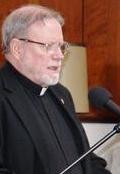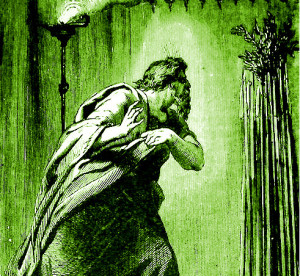by Fr. Patrick Henry Reardon
 Senior Editor of Touchstone Magazine, and archpriest of All Saints Orthodox Church in Chicago, IL, Fr. Patrick is, perhaps, the most erudite writer in the Orthodox Church in North America today. This article, one of his Pastoral Ponderings, was recently published by Orthodoxtoday.org.
Senior Editor of Touchstone Magazine, and archpriest of All Saints Orthodox Church in Chicago, IL, Fr. Patrick is, perhaps, the most erudite writer in the Orthodox Church in North America today. This article, one of his Pastoral Ponderings, was recently published by Orthodoxtoday.org.
Inasmuch as Holy Scripture ascribes to the staff of Aaron such diverse wonders, it is hardly remarkable that Christian readers, over the centuries, have looked upon it as the bearer of numerous mysteries. It is not my intention to question any of those traditional interpretations, but I am especially partial to the view that Aaron’s staff represents the pastoral office in general, and the ministry of preaching in particular.
We may begin by mentioning that the underlying Hebrew word, matteh, not only means “staff” or “rod,” but also “tribe.” It was a symbol, in fact, of tribal authority. Thus, Aaron’s matteh indicated that he was, first of all, the leader of the priestly family, the tribe of Levi. It was entirely appropriate, therefore, that eventually Aaron’s matteh was kept in the Holy of Holies, inside the Ark of the Covenant, along with the Tables of the Law and the jar of Manna (Hebrews 9:4).
Applied to the pastoral ministry of preaching, then, staff of Aaron represents the authority with which the preacher proclaims the Word. The Christian pulpit is not the forum for the sharing of a preacher’s ideas, not even his theological exegetical ideas. It is the place from which the seed of the Word is sown. What is conveyed in the preaching must be nothing other than the Gospel itself.
Thus, some months after evangelizing the Macedonians, Paul wrote to them,
“we preached to you the Gospel of God” (1 Thessalonians 2:9).
Paul sums up that experience:
“when you received the word of God which you heard from us, you welcomed it not as the word of men, but as it is in truth, the word of God, which also effectively works in you who believe” (2:13).
The staff of Aaron is more than a sign of his authority, however; it is the channel of power. Indeed, this is what distinguishes the matteh of Aaron from the other tribal staffs of Israel. Two narratives, in particular, illustrate the power of Aaron’s priestly staff: the encounter with Pharaoh in the Book of Exodus and the test in the Tabernacle in the Book of Numbers. Each of these incidents, I will argue, demonstrates an aspect of the preaching ministry.
First, Aaron’s staff is powerful against the satanic forces represented in the rule of Pharaoh. Even before Egypt was visited with a single plague, that matteh became a snake and devoured the staffs of the sorcerers (Exodus 7:8-12). Then, through the same instrument the Lord visited Egypt with the plagues of frogs and lice (8:5,16,17).
If, then, we understand Aaron’s staff to symbolize the ministry of preaching, the account in Exodus indicates the aggressive, confrontational, and apologetical aspects of the preacher’s task. His message must be ever
“mighty in God for pulling down strongholds, casting down arguments and every high thing that exalts itself against the knowledge of God, bringing every thought into captivity to the obedience of Christ” (2 Corinthians 10:4-5).
Second, Aaron’s staff is the bearer of both beauty and nourishment, because we read of it:
“the staff of Aaron, of the house of Levi, had sprouted and put forth buds, had produced blossoms and yielded ripe almonds” (Numbers 17:8).
 I understand those blossoms to indicate the rhetorical skill in which the Gospel is conveyed. Aaron’s staff is not employed to hit people over the head, but to attract their adherence by the beauty of the Gospel and the sweetness of conscientious persuasion. It is the preacher’s task to attract his hearers to conviction. The Lord compares His Word to honey, after all. So, wrote Gregory the Theologian, the preacher does not use force or violence, but the lure of wisdom.
I understand those blossoms to indicate the rhetorical skill in which the Gospel is conveyed. Aaron’s staff is not employed to hit people over the head, but to attract their adherence by the beauty of the Gospel and the sweetness of conscientious persuasion. It is the preacher’s task to attract his hearers to conviction. The Lord compares His Word to honey, after all. So, wrote Gregory the Theologian, the preacher does not use force or violence, but the lure of wisdom.
The ripe almonds on Aaron’s rod I take to mean the spiritual nourishment provided by pastoral preaching. If the content of the sermon really is the Word of God, then it really will be that by which man lives. It will accomplish what God has promised with respect to His Word:
“For as the rain comes down, and the snow from heaven, / And do not return there, / But water the earth, / And make it bring forth and bud, / That it may give seed to the sower / And bread to the eater, / So shall My word be that goes forth from My mouth; / It shall not return to Me void, / But it shall accomplish what I please, / And it shall prosper in that for which I sent it” (Isaiah 55:1-11).
Fr. Patrick Henry Reardon is pastor of All Saints Antiochian Orthodox Church in Chicago, Illinois, and a Senior Editor of Touchstone: A Journal of Mere Christianity.
